Tesla Model 3: Power Conversion System- Install
Install
- Consider your first step.
- If the removed power conversion system is to be reinstalled, go to step 5.
- If a replacement power conversion system is to be installed, continue to the next step.
- Remove the shipping plugs from the replacement power conversion system.
- Tilt the power conversion system and drain the shipping water into a coolant drain.
- Replace the shipping plugs.
Note: Do not remove the plugs again until instructed.
- Wipe the power conversion system dry.
- Inspect the area of the penthouse where the power conversion system will install, and wipe up any spilled coolant.
Caution:
Spilled coolant can create an electrical path.
- With assistance, use suction cups to lift the power conversion system into the penthouse.
 Vehicles Made Before 9/11/18 - 6-Bolts
Vehicles Made Before 9/11/18 - 6-Bolts
- Install the hex head bolts that attach the power conversion system to
the HV battery, and then mark the bolts with a paint pen after they are
torqued.
 Torque 6-Bolt Power Conversion System to 6 Nm
Torque 6-Bolt Power Conversion System to 6 Nm
 Torque 4-Bolt Power Conversion System to 18 Nm
Torque 4-Bolt Power Conversion System to 18 Nm
 Vehicles Made On 9/11/18 And Thereafter - 4-Bolts
Vehicles Made On 9/11/18 And Thereafter - 4-Bolts
.png)
- Fasten the clips that attach the HV battery AC inlet harness to the power conversion system.
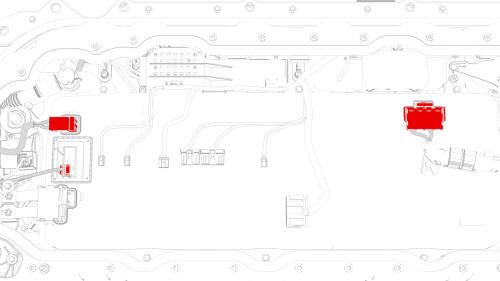
- Connect the HV battery AC inlet harness connector, the DC bus HV connector, and the LV connector to the power conversion system.
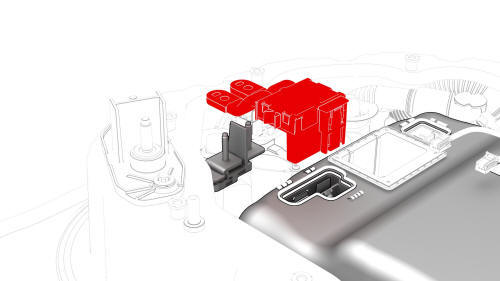
- Connect the DCDC harness to the power conversion system, and then fasten the clip that attaches the DCDC harness to the power conversion system.
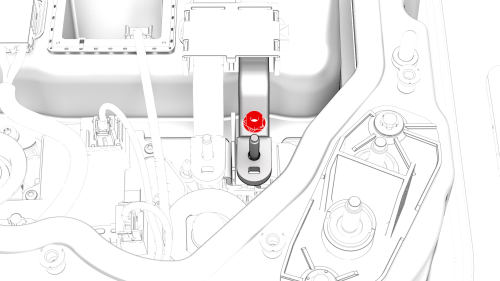
- Install the nut that attaches the negative terminal of the DCDC harness
to the negative DCDC passthrough busbar, and then mark the nut with a paint
pen after it is torqued.
.jpg) Torque 4.5 Nm
Torque 4.5 Nm
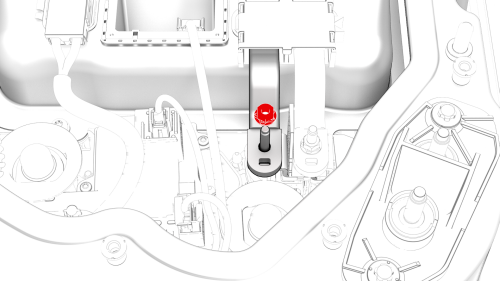
- Install the nut that attaches the positive terminal of the DCDC harness
to the positive DCDC passthrough busbar, and then mark the nut with a paint
pen after it is torqued.
.jpg) Torque 4.5 Nm
Torque 4.5 Nm
.jpg) Generic Measurement - Actual busbars and fasteners might appear
different
Generic Measurement - Actual busbars and fasteners might appear
different
- Use the Hioki resistance meter to measure the resistance between the positive joint of the DCDC harness and the positive terminal of the 12V DCDC passthrough.
Note: The maximum acceptable resistance is 0.100 mΩ (100 μΩ). If the resistance is above this value, escalate a Toolbox session, as appropriate.
.jpg) Generic Measurement - Actual busbars and fasteners might appear
different
Generic Measurement - Actual busbars and fasteners might appear
different
- Use the Hioki resistance meter to measure the resistance between the negative joint of the DCDC harness and the negative terminal of the 12V DCDC passthrough.
Note: The maximum acceptable resistance is 0.100 mΩ (100 μΩ). If the resistance is above this value, escalate a Toolbox session, as appropriate.
- Cut a slit halfway through 2 absorbent pads and surround each power conversion system coolant tube fitting with a pad.
- Lubricate the coolant output tube and coolant input tube o-rings with Silaramic lubricant.
- Remove the plugs from the coolant output port of the power conversion system and coolant output tube.
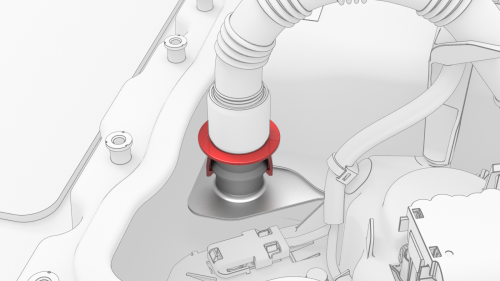
- Connect the coolant output tube to the power conversion system. See Tube - Output - Coolant - Power Conversion System (Remove and Replace).
Caution:
Make sure that the coolant output tube is securely connected by firmly pressing down on it, verify that both clips have fully engaged the barb on the power conversion system, and then pull up on the fitting to check retention.
- Wipe up any spilled coolant.
Caution:
Spilled coolant can create an electrical path.
- Remove the plugs from the coolant input port of the power conversion system and the coolant input tube.
.png)
- Connect the coolant input tube to the power conversion system. See Tube - Input - Coolant - Power Conversion System (Remove and Replace).
Caution:
Make sure that the coolant input tube is securely connected by firmly pressing down on it, verify that both clips have fully engaged the barb on the power conversion system, and then pull up on the fitting to check retention.
- Wipe up any spilled coolant.
Caution:
Spilled coolant can create an electrical path.
- Perform a penthouse coolant leak test. See Penthouse Coolant Leak Test.
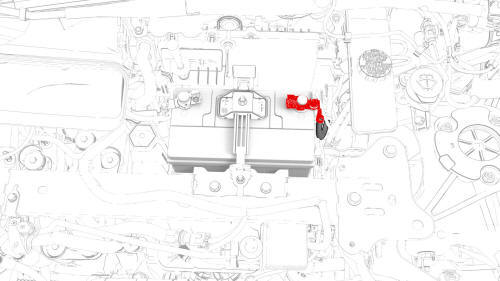
- Connect the 12V auxiliary battery negative terminal only.
 Torque 6 Nm
Torque 6 Nm
Caution:
Do not follow the procedure to connect 12V power at this time.
- Connect a 12V charger to the 12V auxiliary battery terminals.
- Refill the coolant. See Penthouse Coolant (Drain and Refill).
- On the touchscreen, touch Controls > Safety & Security > Vehicle Power > Power Off.
- Disconnect the 12V charger from the 12V auxiliary battery terminals.

- Disconnect the 12V auxiliary battery negative terminal.
.png)
- Install the hinge tray vertically onto the hinges, press down on the tray at each hinge so that the tray attaches into the hinges, and then lower the tray.
.png)
- Fasten the clips that attach the harness to the hinge tray.
- Install the high voltage controller. See Controller - High Voltage (Remove and Replace).
- Install the pyrotechnic battery disconnect into the penthouse. See Pyrotechnic Battery Disconnect (Remove and Replace).
- Flash the power conversion system with the latest firmware.

